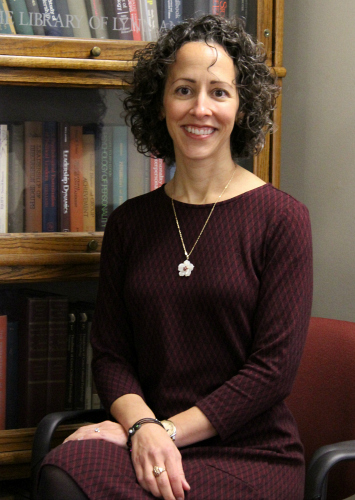Annmarie Cano, professor and associate dean of Wayne State’s Graduate School, recently attended the Higher Education Resource Services (HERS) Institute and Luce Program at Bryn Mawr College in Pennsylvania. HERS is an educational nonprofit that provides women in higher education with leadership and management development skills.
 Cano was one of 68 female leaders selected to attend the program, and one of 34 women who also participated in the Luce program, which focuses on women in science, technology, engineering and mathematical (STEM) fields.
Cano was one of 68 female leaders selected to attend the program, and one of 34 women who also participated in the Luce program, which focuses on women in science, technology, engineering and mathematical (STEM) fields.
Cano, who specializes in research on chronic pain and relationships, recently completed an article about a novel mindfulness-based intervention for couples facing pain that will be available in print in 2018 from Cognitive Behavioral Practice.
We asked Cano to tell us about the HERS Institute and her research.
Can you tell us more about your experience with the HERS Institute and the Luce Program?
I was nominated to attend HERS by Associate Provost and Graduate School Dean Ambika Mathur and Associate Provost and Chief Diversity Officer Marquita Chamblee. I spent 12 days at Bryn Mawr College and participated in the HERS Institute and the Luce Program. The Luce program is designed for women who are involved in STEM education.
We did a lot of group work in the Luce Program and talked about how to increase the numbers of women in higher education and STEM leadership. HERS and Luce were eye opening because I was able to discuss the challenges women face in higher education and STEM and generate solutions. I now have a network of like-minded women who can support me in my work at Wayne State University.
How did you get interested in your research of how chronic pain can affect romantic relationships?
I’ve always been interested in why relationships work the way they do and what different people bring to their relationships. This led me to an interest in romantic relationship dynamics. In graduate school I had an internship in a pain clinic treatment center and saw that some people with pain had spouses who were too helpful and wouldn’t let them do their exercises or build up their body strength and this was problematic to their recovery.
On the other hand, there were patients who had hostile spouses who belittled them about their pain and this also affected their treatment outcomes. I saw that I could incorporate this into my interest and research on couples. I wanted to do something to help couples who experience chronic illness because there is clearly miscommunication that occurs.
How does chronic pain affect both partners in a romantic relationship?
Chronic pain is unique because it is often invisible. The person in pain knows they are feeling pain, but an outside observer cannot see how much pain the person has; this includes their loved ones. Some couples talk openly and honestly about their internal states, like pain. These couples work together and communicate well. Other couples, because they may be afraid to talk about pain, don’t communicate effectively with their partner. This creates a strain on the relationship because the partner is hiding something and it’s never good to hide things from a partner.
The purpose of my research is to improve the quality of life in the partner experiencing pain directly and the partner who experiences it indirectly. I have found that a positive way to deal with pain is to name one’s feelings including fear, anger, or sadness about pain and to talk about these feelings with a partner. Partners need to accept those feelings without rejecting them. When people reject the feeling they are also rejecting the person.
Our research has shown that being there for your partner who experiences pain is related to less pain, less depression and better relationship quality. This process is healing for both people in the relationship.
